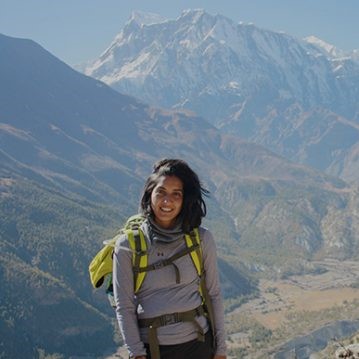
About
| Grad Year | 2016 |
| Current Job Title | Head of Strategy and Impact| Senior Management Team |
| Current Employer | Humanitarian OpenStreetMap Team |
| Current Location | Uganda |
| Hometown | Pickering, ON, Canada |
"The confidence that I gained from taking leaps while in university helped me to continue doing so when I entered the real world."
What kind of academic opportunities did you partake in?
I worked as a research assistant on a number of projects with professors whom I respected as academics and admired as individuals. The roles that I held on projects in different departments allowed me to develop valuable research skills and gain a better understanding of the academic research process and gave me the opportunity to learn directly about current issues.
Working extensively with Dr. Karen Bakker on a project titled, “Sustainable Water Governance and Indigenous Law,” exposed me to issues surrounding Indigenous water governance in the Canadian context. For me, this experience was pivotal, as it reminded me that human rights violations are not limited to nations with unstable economies, but can exist in our own backyards.
I also supported Dr. Nathan Lauster on a project titled, “Making Housing Home,” which examined the relationship between people’s daily routines in Vancouver, their socio-economic background, and what their meaning of home was.
Prior to this, I had enjoyed taking Dr. Lauster’s class on urban sociology and, subsequently, asked him to supervise my project in a directed studies seminar. This is a self-directed research project that any student can undertake with the supervision of a professor. Instead of designing my own project, he invited me to work on the ongoing Making Housing Home project, which eventually led to a research assistant position when I completed my seminar.
Where did you travel to for your international experience requirement?
Exchange to France: It was one of the most enriching experiences during my degree. It was the first time I had gone abroad on my own and was essentially forced to figure it out as life happened. Looking back, I don’t remember the challenges that I faced in the first few weeks, instead I fondly think back to the incredible people coming from different corners of the world, the exciting weekends spent exploring new European cities, and the invaluable lessons I gained from jumping into the unknown hoping that it would be okay.
Most importantly, the experience made me cognizant of my ability to thrive when taken out of my comfort zone which, in turn, has led me to persistently challenge my limits and to take as many of the opportunities that come my way as possible.
What are your main responsibilities in your current position?
Recently, I joined the “Climate Migrants and Refugees Project” as a research manager. This is a non-profit founded by a group of students from UBC’s School of Community and Regional Planning. Recognizing the implications that climate change will have on human migrations, the project aims to develop a toolbox and short-term recommendations for different stakeholders to use to effectively resettle future influxes of people displaced by climate-related disruptions. In my role, I am supporting the project by developing its research plan, identifying information gaps in existing literature, and building capacity to understand related issues at different scales.
How did the GRS program and UBC prepare you for this role?
The remarkable network of friends, peers, professors, advisors, and counsellors that I had at UBC has undoubtedly had the most significant impact on my career and future plans.
My recommendations to both incoming and current students is this: visit your professors during office times often; check in with your advisor about courses and career counselling regularly; schedule an appointment with a counsellor when you’re feeling overwhelmed; attend as many campus events as you can possibly handle; hang out at the campus pub and introduce yourself to new people. Doing these things allowed me to build a diverse network on campus, which played a tremendous role in making my time at UBC some of the most transformative years of my life.